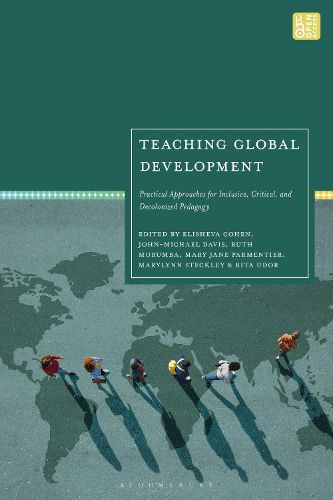Readings Newsletter
Become a Readings Member to make your shopping experience even easier.
Sign in or sign up for free!
You’re not far away from qualifying for FREE standard shipping within Australia
You’ve qualified for FREE standard shipping within Australia
The cart is loading…






The first volume of its kind, Teaching Global Development offers a unique open access collection of current approaches to teaching development in ways that foreground core ethical issues. Hailing from a range of disciplines and from across the world, the contributors gathered here describe what global development means in their context, offer strategies for more ethical syllabi, describe innovative ways to explore equity and diversity through readings and activities, and provide detailed case studies of GDS-related programs. Throughout, these chapters showcase new and innovative approaches to service learning, lesson plans, and activities that demonstrate what critical, decolonized, DEI-sensitive knowledge actually looks like.
For its topical breadth, theoretical sophistication, and uniquely concrete examples and suggestions, this book is a must-read for scholars, instructors, and students interested in the ethics not only of global development, but also of curriculum-setting and pedagogy more broadly.
The ebook editions of this book are available open access under a CC BY-NC-ND 4.0 licence on bloomsburycollections.com. Open access was funded by Indiana University and Worcester Polytechnic Institute.
$9.00 standard shipping within Australia
FREE standard shipping within Australia for orders over $100.00
Express & International shipping calculated at checkout
Stock availability can be subject to change without notice. We recommend calling the shop or contacting our online team to check availability of low stock items. Please see our Shopping Online page for more details.
The first volume of its kind, Teaching Global Development offers a unique open access collection of current approaches to teaching development in ways that foreground core ethical issues. Hailing from a range of disciplines and from across the world, the contributors gathered here describe what global development means in their context, offer strategies for more ethical syllabi, describe innovative ways to explore equity and diversity through readings and activities, and provide detailed case studies of GDS-related programs. Throughout, these chapters showcase new and innovative approaches to service learning, lesson plans, and activities that demonstrate what critical, decolonized, DEI-sensitive knowledge actually looks like.
For its topical breadth, theoretical sophistication, and uniquely concrete examples and suggestions, this book is a must-read for scholars, instructors, and students interested in the ethics not only of global development, but also of curriculum-setting and pedagogy more broadly.
The ebook editions of this book are available open access under a CC BY-NC-ND 4.0 licence on bloomsburycollections.com. Open access was funded by Indiana University and Worcester Polytechnic Institute.